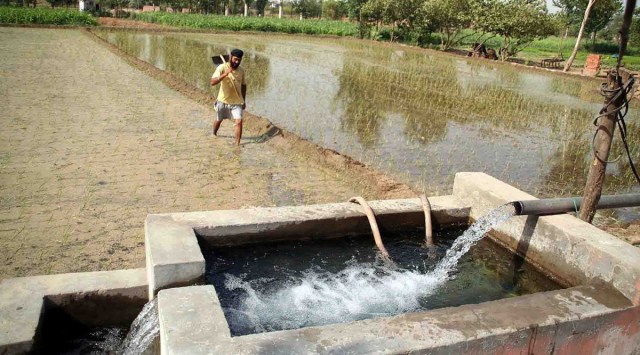OBSERVING THAT the primary reason for excessive exploitation of groundwater is wide cultivation of water guzzler paddy and sugarcane crops, which are “heavily incentivized”, a Parliamentary Standing Committee has said that use of electric pumps needs to be further discouraged by introducing measures such pre-paid cards for power supply and restricting power supply to few hours a day.
The committee has recommended that the Department of Water Resources, River Development and Ganga Rejuvenation under Jal Shakti Ministry should take the initiative by urging both the Power Ministry and Department of Agriculture and Farmers Welfare along with state governments to take measures on the suggested lines.

In its report, “Groundwater: A Valuable but Diminishing Resource”, which was tabled in Parliament on Monday, the Standing Committee on Water Resources said, “States like Punjab, Haryana, Telangana and Tamil Nadu offer completely free power, while other states have provision for collection of token charges.”
According to the report, the committee observed that while restricting free electricity to the farmers will certainly reduce the misuse of groundwater, both the Department of Water Resources, River Development and Ganga Rejuvenation and Department of Agriculture and Farmers Welfare “have expressed inability to persuade states to reduce/stop subsidy for power given in agriculture as electricity is a concurrent subject and SERCs determine the electricity tariff for retail supply of electricity to end consumers under the extant provisions of Electricity Act, 2003”.
“The Committee, however, note that Punjab introduced a scheme by way of which farmers were refunded money if they consumed less electricity. They further note that under Deendayal Upadhyay Gram Jyoti Yojana of Ministry of Power, separate component of agriculture and non-agriculture feeders have been created for facilitating judicious rostering of supply to agriculture & non-agriculture consumers in rural areas,” the report said.
“However, groundwater continues to be used excessively for catering to irrigation demands. Therefore, the Committee are of the view that use of electric pumps need to be further discouraged by way of devising such measures as introduction of pre-paid cards for power supply, restricting it for a few hours in the day, etc,” it said.
The committee, headed by BJP member Parbatbhai Savabhai Patel, also asked the government to devise “integrated measures” for adoption in agriculture to reduce dependence on groundwater in agriculture.
Story continues below this ad
“The Committee notice that over-extraction of groundwater for meeting irrigation needs is prevalent mainly in northern states, particularly in Punjab, Haryana and Rajasthan, which are extracting 97%, 90% and 86% of groundwater, respectively, for this purpose. Other states such as Karnataka, Tamil Nadu and Uttar Pradesh are also significant users of groundwater for irrigation as they are using approximately 89%, 92% and 90%, respectively, of their total groundwater extraction for agricultural purposes,” said the report.
“Main reason for such over exploitation of ground water is due to wide cultivation of water guzzler paddy and sugarcane crops which are heavily incentivized by way of highly subsidized pricing of water, power, fertilizers on one hand and assured markets for their outputs through procurement of rice in Punjab-Haryana belt and of sugarcane by sugar factories at government determined prices,” the report said.
The committee noted that the progress made in terms of bringing down the groundwater use is “minimal.”
“The Committee therefore, recommend, devising integrated measures for adoption in agriculture, to reduce dependence on Ground water in agriculture,” said the report.
Story continues below this ad
The committee also said that there is a need for shift in focus from ‘land productivity’ to ‘water productivity’.
“The Committee, would therefore, recommend the Ministry of Jal Shakti to work out a policy to ensure judicious water use not only to reduce dependence on groundwater but to reduce its footprint in agriculture. In this regard, the Committee would like to emphasise that in addition to land productivity, water productivity i.e. production per cubic meter of water should be a major criteria in decisions relating to crop production,” said the report, adding that the Ministry of Jal Shakti should engage with Agriculture Ministry to enable formulation of appropriate policy decisions relating to crop production in the country.









